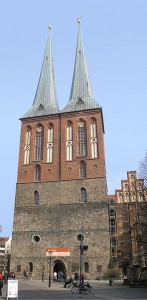The crowds asked him, “What should we do?” (Luke 3:10 NRSV) Even tax collectors…asked him, “What should we do?” (Luke 3:12 NRSV) Soldiers also asked him, “And we, what should we do?” (Luke 3:14a NRSV)
 Margie and I spent a couple of days in Berlin on our trip to Germany. Most of us can still remember Berlin divided into East Berlin and West Berlin, separated by the Berlin wall. We saw checkpoint Charlie and portions of the Berlin wall that was left standing as a remembrance. Our bus also drove past the church that played a key role in the fall of the wall. A group of Christians started gathering in this church once a week, praying for the wall to come down and a peaceful unification of Germany. This group continued to increase in number and finally in 1990 because of their prayers Germany was peacefully united. As we listen again to John the Baptist preaching in the wilderness we tend to hear John’s message addressed to us as individuals. Part of the problem is that we in the United States emphasize individuals and their responsibilities. But at the time of Jesus the emphasis was on the community. The questions asked of Jesus was not “What should I do?” but rather “What should we do?”. Too often churches emphasis has been on individually responsibilities. But how often have we as members of churches asked, how can we as a community of believers make the world a better place? John tells the crowd to share food and clothing with the needy. How can we as a church do more to address the problems of hunger and poverty? John tells the tax collectors to stop skimming, which raises the question of what can we as a church do to address unfair tax policies in our state and nation? John in sermon is telling everyone that they must bear fruits. Do we as a church produce the fruit that is needed or are we like the soldiers guilty of complaining? Complaining that we are too small, or that we don’t have enough money, or that no one wants to do anything? In our individualistic society it becomes easy to interpret John’s words as being addressed to us as individuals. But John is addressing groups of people not individuals. John knew that a group could do more to change society than a single individual. That is still true today. But it takes people working and praying together to accomplish it. John not only calls on churches to repent of past mistakes but encourages them to become agents of change in our world.
Margie and I spent a couple of days in Berlin on our trip to Germany. Most of us can still remember Berlin divided into East Berlin and West Berlin, separated by the Berlin wall. We saw checkpoint Charlie and portions of the Berlin wall that was left standing as a remembrance. Our bus also drove past the church that played a key role in the fall of the wall. A group of Christians started gathering in this church once a week, praying for the wall to come down and a peaceful unification of Germany. This group continued to increase in number and finally in 1990 because of their prayers Germany was peacefully united. As we listen again to John the Baptist preaching in the wilderness we tend to hear John’s message addressed to us as individuals. Part of the problem is that we in the United States emphasize individuals and their responsibilities. But at the time of Jesus the emphasis was on the community. The questions asked of Jesus was not “What should I do?” but rather “What should we do?”. Too often churches emphasis has been on individually responsibilities. But how often have we as members of churches asked, how can we as a community of believers make the world a better place? John tells the crowd to share food and clothing with the needy. How can we as a church do more to address the problems of hunger and poverty? John tells the tax collectors to stop skimming, which raises the question of what can we as a church do to address unfair tax policies in our state and nation? John in sermon is telling everyone that they must bear fruits. Do we as a church produce the fruit that is needed or are we like the soldiers guilty of complaining? Complaining that we are too small, or that we don’t have enough money, or that no one wants to do anything? In our individualistic society it becomes easy to interpret John’s words as being addressed to us as individuals. But John is addressing groups of people not individuals. John knew that a group could do more to change society than a single individual. That is still true today. But it takes people working and praying together to accomplish it. John not only calls on churches to repent of past mistakes but encourages them to become agents of change in our world.
